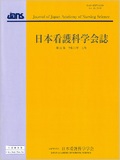Japanese
English
- 販売していません
- Abstract 文献概要
- 参考文献 Reference
要旨
目的:小学4〜6年生の唇顎口蓋裂患児の病気に対する思いを明らかにする.
方法:2018年8月〜9月にA病院に通院または入院中の小学4〜6年生の唇顎口蓋裂患児11名を対象に,病気に対する思いについて半構造化面接を行い,質的記述的研究手法を用いて分析を行った.
結果:病気に対する思いは29コードが抽出され,8カテゴリ【生まれたときの自分の口の形や骨がないことを知り驚いた】【自分の歯や人中がないことを聞いても驚かなかった】【自分の病気は歯が生えないことを改めて実感する】【どうして病気になったんだろう】【病気は治るのかな】【自分の病気は知っておくほうがいい】【病気は他人にはわからないから気にしていない】【重く考えすぎないように普通にふるまったほうがいい】に分類された.
結論:具体的操作期になり,患児が自分の病気を実感を伴って理解し,そして病気について悩みを抱くことが明らかとなった.患児の病気の理解を深められるように,説明をすることの重要性が示唆された.
Objectives: This study aimed to assess the feelings of fourth-sixth-grade elementary school children with cleft lip and palate about their disease.
Methods: From August to September 2018, we conducted a semi-structured interview with 11 upper elementary school children with cleft lip and palate who were either inpatients or outpatients of Hospital A on their perception of their disease. Their responses were analyzed using a qualitative descriptive method.
Results: A total of 29 codes were extracted to assess the children's feelings on the disease, and they were classified into 8 categories. The 8 categories were: “I was surprised to learn that I was born with no mouth-shape or bones,” “I was not surprised to hear about my teeth and the lack of a philtrum,” “I am reminded that my disease includes not teething,” “I do not know how I got sick,” “I wonder if the disease can be cured,” “I had better know about my disease,” “I do not care my disease because others cannot see it,” and “It is better to act normal and not take it too seriously”.
Conclusions: In the concrete operation period, it became clear that the children understood their disease with a sense of reality and were troubled by them. It was suggested that nurses should provide explanations to the children so that they can improve their understanding of their condition.
Copyright © 2021, Japan Academy of Nursing Science. All rights reserved.


